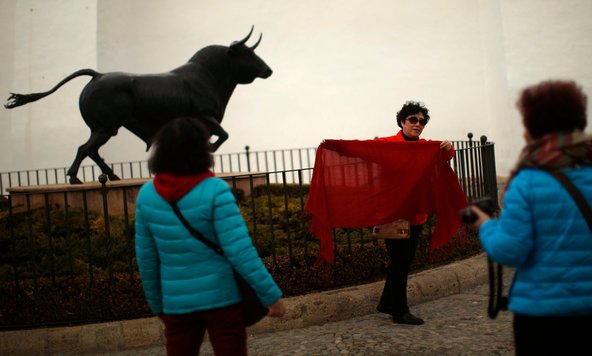Mario Draghi has delivered — for now, at least.

After more than a year of speculation, Mr. Draghi, the never-predictable head of the European Central Bank, has given global investors what they have clamored for, with an extra twist: an open-ended commitment to buy eurozone government bonds in bulk.
And in doing so, Mr. Draghi announced to the world that Europe, stuck in a cycle of low growth and deflation, would at long last follow the lead of the United States, Japan and Britain by unleashing the full money-printing powers of its own central bank.
Across the board, the yields on eurozone bonds, from Germany to Greece, declined as traders rushed to scoop up bonds before the E.C.B. started buying. Riskier corporate and high-yield bonds, as well as European stocks, also rallied strongly on the news. The euro, already on a downward slope, lost 2 percent against the dollar, to $1.1361.
Stocks in the United States, which have been under pressure in recent weeks, surged on the news, with the Standard & Poor’s 500-stock index increasing 1.5 percent for the day.
While Mr. Draghi had been expected to announce a plan to buy eurozone government bonds, the size and extent of the purchases came as a surprise.
Investors worldwide have been piling into the riskiest sovereign bonds in the eurozone, driving their yields to historic lows even as many of these countries (Italy, Portugal and Greece, in particular) are seeing their debt burdens increase.
But by targeting a larger than expected 1.1 trillion euros’ worth of bonds and by leaving room to keep the program going beyond 2016, Mr. Draghi gave his bond-buying bid an added charge of adrenaline.
He doubled down, in effect, on the now-famous promise he made two years ago to do whatever it takes to save the euro.
This is a victory for the idea of monetary dominance in Europe, said C. Randall Henning, an economist at American University in Washington, who had just completed a paper arguing that the central bank should assume a more activist role in combating economic stagnation. The E.C.B. is right to follow the Fed in this regard, and the sooner the better.
Of course, monetary dominance — a term that Mr. Draghi actually used during his news conference on Thursday — is no easy trick when a central bank must satisfy the whims and needs of 19 economies.
But it was Mr. Draghi’s ability to fend off objections from Germany, Europe’s economic powerhouse, that gave investors hope on Thursday that the E.C.B.’s bond-buying program would, unlike past efforts, continue well into the future.
For Mr. Draghi, though, the best news of the day may have been the sharp fall of the euro, whose 2 percent drop against the dollar was quite an acute move for such a widely traded currency. While the rally in eurozone bonds has lasted the better part of two years, the euro’s precipitous fall — it is now trading near an 11-year low — has been more recent, driven in part by a move by global central banks to keep less of their reserves in low-yielding euro assets.
Over the past six months, the euro has dropped 15 percent, although its decline has been most pronounced in recent weeks as investors of all stripes have been switching out of euros to dollars.
Many economists believe that it will be a cheaper euro, and not rock-bottom interest rates on government bonds, that will lead to an increase in economic activity in the eurozone.
That could come via increased German exports; American and Japanese tourists flocking to Greece, Italy and Spain; and, most crucially, higher prices paid for imports by European consumers that might lift inflation.
Draghi’s No. 1 goal is to weaken the currency, said Dean Popplewell, a currency specialist at Oanda, an online currency trading firm based in Toronto. He has thrown all the tools in the kitchen at the problem. Now, we have to see if he gets results.
Mr. Popplewell said he believed that the next psychological level to be tested by the market will be 1.10 euros to the dollar, with parity, or 1 euro to the dollar, the ultimate target for euro bears.
As it stands now, the central bank will start buying about 60 billion euros, or $69 billion, in mostly government bonds each month, starting in March, until September 2016. Crucially, Mr. Draghi said that if the bank was not closer to hitting its 2 percent inflation target by then, the buying could continue.
The amount to buy each month is to be linked to each country’s size, which means that the bonds of Germany, France, Italy and Spain would make up the bulk of the purchases.
In terms of Greece, where worries abound that a radicalized new government could push for a debt restructuring, Mr. Draghi indicated that if Greece continued with its reforms and followed through with a large bond repayment to the E.C.B. in July, it could be included in the program.
Greek elections are scheduled for Sunday, and the left-leaning Alexis Tsipras, who has talked about restructuring Greece’s debt, holds a strong lead in the polls.
While the bond-buying targets may seem large, they are by no means infinite. The E.C.B. said that it would buy no more than 33 percent of a country’s outstanding bonds. For countries that have issued lots of government bonds, like Italy and France, the impact of the program could be significant since it would take quite some time to hit that benchmark.
For smaller countries, like Ireland and Greece, that have experienced bailouts and, as a result, have less debt trading in the market, the opposite could be true and the E.C.B. could reach that target quickly, pushing those countries out of the program.
Greece has the highest interest rates in Europe and has been hurt the most by deflation, so such an outcome could be disastrous.
Analysts were mostly in agreement that Mr. Draghi’s bond-buying bet stands out as perhaps the most powerful step to aid Europe as a whole since the debt crisis flared up more than four years ago.
That does not mean the plan is destined to succeed. Even with an aggressive stimulus program by its central bank and a weak currency, Japan, for example, still suffers from deflation.
Still, with growth stagnating and prices falling in Europe, there were few other options available to Mr. Draghi other than buying government bonds.
You know it won’t work if you don’t do it, said Mr. Henning, the eurozone expert. But if you do do it, it could have a substantial effect.





